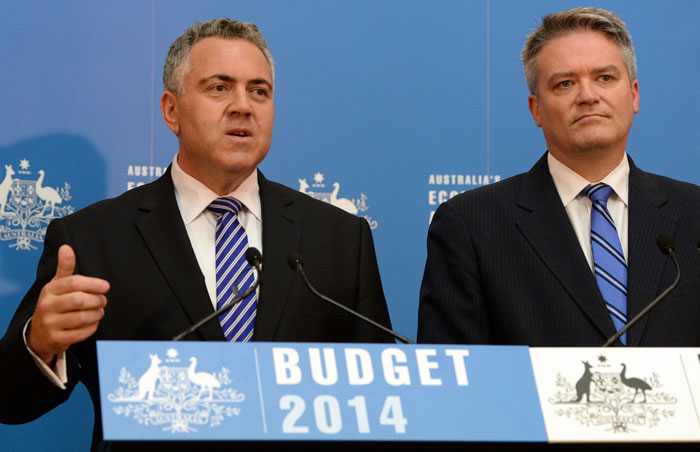A file photo taken in Canberra on May 13, 2014 shows Australia's treasurer Joe Hockey (left) speaking at a press conference with finance minister Mathias Cormann. Australia's upper house has agreed to scrap the resources profits tax.
AFP
Australia's upper house on Tuesday agreed to scrap a contested resources profits tax after the government struck a surprise deal with crossbench senators, including mining billionaire Clive Palmer.
The Minerals Resource Rent Tax was introduced by the previous Labor administration in 2012, with a levy on annual profits above Aus$75mn (US$70mn) on iron ore and coal at a rate of 30%.
It was intended to return a share of the spoils of Australia's decade-long mining boom to government coffers but was widely criticised after its revenues fell dramatically short of forecasts.
"The mining tax is now gone," triumphant Treasurer Joe Hockey told parliament after the Senate voted 36 to 33 for its repeal, a key election promise of the Tony Abbott-led conservatives.
"We said we'd get rid of the mining tax; we've delivered in full."
Scrapping the tax was made possible after the government did a deal with minor parties led by the Palmer United Party, whose powerbroker leader is a coal magnate.
Palmer always wanted the tax gone but said he would not support a repeal unless crucial initiatives to assist families - which were threatened by budget cuts - were left unchanged. A compromise was reached.
Greens party leader Christine Milne said the deal was a win for the big miners and for the flamboyant Palmer, who last month issued an apology after outraging Beijing by calling China's leaders "mongrels" who "shoot their own people".
"If ever there is a conflict of interest, it is this one," she told the Senate.
"How is it possible that you can have a coal billionaire voting to vote down a mining tax?"
Palmer insisted the move made no difference to his coal mining interests in Queensland, saying he was "retired" and was no longer chairman of any company.
"We all pay tax. Does that mean that members of parliament don't vote on income tax bills?" he told reporters.
Dumping the tax was a major win for Abbott. It follows his victory in July when he succeeded in abolishing a divisive carbon levy after years of vexed political debate.
Australia satisfied on India's nuclear safeguards
Australia is satisfied with the safeguards India has in place to allow the export of uranium to the nuclear-armed nation, Trade Minister Andrew Robb said on Tuesday.
Prime Minister Tony Abbott is due to arrive in India on Thursday for his first visit to the country since assuming power a year ago and is expected to sign a deal clinching the export of uranium.
Work on an agreement has been under way for several years as Canberra attempts to strengthen ties with the fast-growing and energy-hungry South Asian country.
But because India is not a signatory to the Nuclear Non-Proliferation Treaty, any exports have to be accompanied by guarantees the uranium will only be used for non-military purposes.
Asked what steps had been taken to make sure there were appropriate safeguards, Robb told ABC radio: "We have satisfied ourselves that the steps are in place. "
Australia does not use nuclear power but it is the world's third-ranking uranium producer behind Kazakhstan and Canada.

